Annual Report 2018/2019
Competitiveness & Communications
“When we talk about Canada’s economic future, we are speaking about the livelihoods of the 1.7 million men and women who work for our companies, and millions more in the families and the communities that benefit from those jobs.”
– Don Lindsay Chair | Business Council of Canada
Since 1976, the Business Council of Canada has been at the centre of many of the country’s most important public policy debates and initiatives.
Who We Are
The Council is composed of the chief executives and entrepreneurs
of 150 leading Canadian companies, in every industry sector and
region of the country. Our companies:
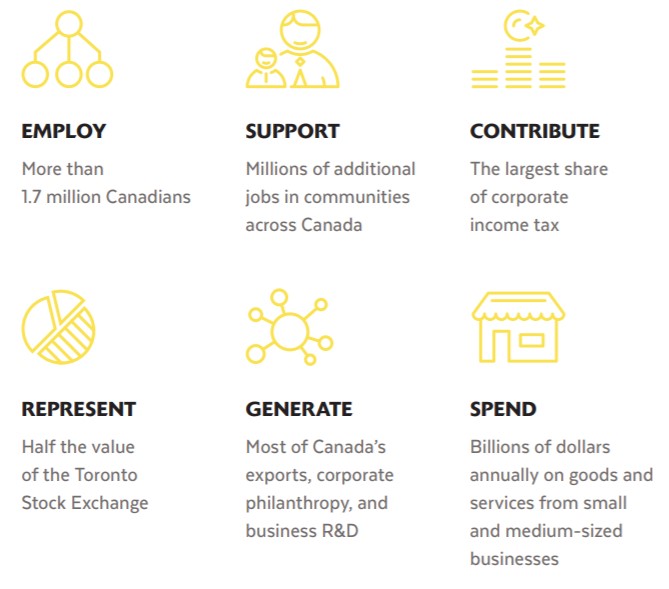
Our History
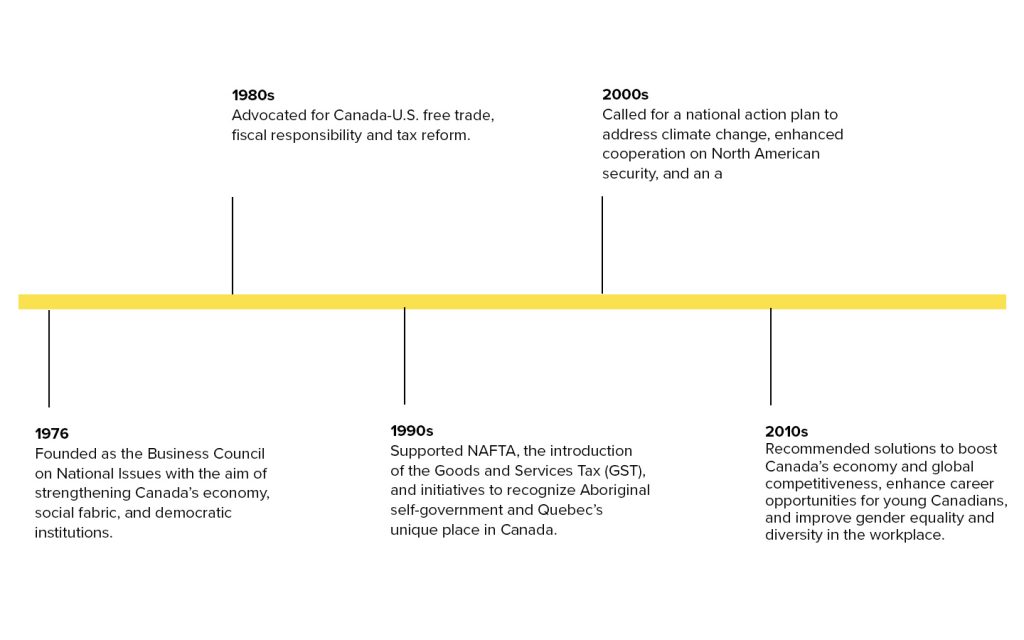
“Our objective is to help strengthen the country’s economy,
its social fabric, and its democratic institutions.”
Founders’ statement
Message from the Chair

As a member of the Business Council of Canada since 2005, I have seen first-hand the important policy and advocacy work this organization has led over the years. Each of my predecessors as Chair – most recently Linda Hasenfratz, Paul Desmarais Jr., and Hartley Richardson – has brought his or her own unique vision to the role, contributing to the Council’s many significant achievements. When I was invited to identify a theme for my tenure, I spoke with many of my fellow Council members. What I heard consistently from business leaders across Canada was that both the economic and policy environments have changed, and we must change with them. Globally, the competition for investment, ideas and talent has never been more intense. This poses obvious challenges for Canada, a relatively small market that is at risk of being leapfrogged by more agile and ambitious competitors. Meanwhile, social media and the power of peer-to-peer networks are reshaping many aspects of our lives, including how we engage as citizens. To be impactful and to reach a broader audience, we need to communicate differently than we have in the past. This is why I chose competitiveness and communications as equal priorities for my term as Chair. Both themes were reflected in the launch of our Task Force on Canada’s Economic Future in early 2019. Co-chaired by Louis Vachon, Nicole Verkindt and Chuck Magro, the Task Force has already had a measurable impact. It has engaged 1.1 million Canadians through social media and solicited input from hundreds of stakeholders – many of whom
were not traditionally part of our network. A growing number of Canadian business leaders have joined the conversation by sharing their ideas and perspectives. Through newspaper op-eds, at local chambers of commerce, on TV screens and over social media feeds, CEOs have engaged with broad and diverse audiences on issues that matter to all Canadians. We are off to a good start, but there is much more to do. Since 1976, the Business Council of Canada has been an effective voice for the country’s business leaders. But when we talk about Canada’s economic future, we are speaking about the livelihoods of the 1.7 million men and women who work for our companies, and millions more in the families and the communities that benefit from those jobs. Our success is about ensuring Canada can continue to prosper and grow to benefit not only our children and grandchildren, but generations to come.
Don Lindsay
Chair | Business Council of Canada
Message from the President and CEO

From the moment our family arrived in Canada in the 1970s, my parents told us how lucky we were to have come to such a peaceful, compassionate, and welcoming country. At the same time, they didn’t hide their frustrations when it seemed to them that Canadians were taking their blessings for granted or wasting too much time fretting over small things. “The problem in Canada is we have no problems,” my father would lament, “so we make them up!” I have thought a lot about those words since assuming the leadership of this remarkable organization. Canada is an unbelievably fortunate country – but it has the potential to be even better. We simply need to move beyond the trivial matters that divide us and set our collective sights higher. We need ambition similar to the “own the podium” approach
that put Canada on top in the Vancouver Winter Olympics. After all, why settle for silver or bronze when we have what it takes to win gold? For the past 43 years, under the leadership of Thomas d’Aquino and then John Manley, the Business Council of Canada has endeavoured to make Canada the best country in the world in which to live, work, invest and grow. Our members include many of the country’s leading CEOs and entrepreneurs – men and women who are committed to the well-being of their employees and communities. When I meet with our members, I am struck by their passion for Canada and their determination to see Canada succeed on the world stage.
It’s in that spirit that we launched our Task Force on Canada’s Economic Future. In an era of political polarization, technological transformation and rising competition, we cannot afford to take anything for granted. The global landscape is a very competitive one. To preserve Canadians’ high quality of life, we need to be ambitious, forward-looking, and united. Over the past year, our task force worked with diverse stakeholders and Canadians across the country to identify policies that will improve Canada’s economic future and by extension the everyday lives of Canadians. Our members also focused on what their companies can do on their own to address some of the major social issues of the day from mental health, indigenous reconciliation, and climate change among others. In the coming pages, you’ll read about many of our initiatives and some of the year’s most important accomplishments. I want to extend sincere thanks to the hardworking Council staff and to all the business leaders across Canada who have contributed their time and energy. While there is much to do, I have seen the spark of something special and am excited for what comes next.
Goldy Hyder
President and Chief Executive Officer | Business Council of Canada
Policy Priorities
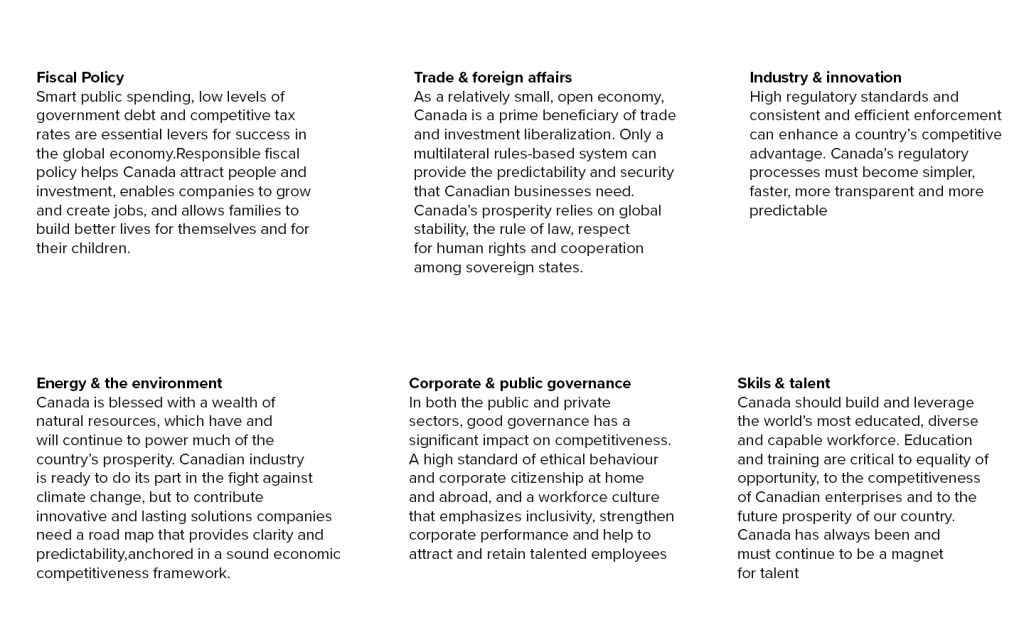
Year in Review
A timeline
Trade tensions, rising global instability and uncertainty over Canadian energy policy have emerged at a time when Canada’s competitiveness has been gradually eroding.
“There are two issues: One, we in Canada have been doing a number of things to shoot ourselves in the foot. Two, the world outside is changing and creating a number of uncertainties for investment in Canada, both public and private investment.”
David Dodge | former Governor of the Bank of Canada

August 2018
Putting competitiveness on the agenda
In a submission to the House of Commons Standing Committee on Finance, the Council calls on the federal government to put forward a plan to protect and grow the Canadian economy in the face of increasing international competition and uncertainty. The submission quotes an internal survey that suggests only one in seven CEOs has confidence in the competitiveness of Canada’s business climate.
“To attract and promote new business investment, we recommend that Budget 2019 include a temporary tax measure allowing companies to immediately deduct the full amount of capital expenditures.”
John Manley
Tariffs and trade
In the wake of the Trump Administration’s decision to impose tariffs on Canadian steel and aluminum – and amid an escalating trade war between Washington and Beijing – the Business Council of Canada and its U.S. counterpart, Business Roundtable, urge negotiators to redouble their efforts to modernize to the North American Free Trade Agreement (NAFTA). Failure to do so, they warn, “would destabilize North American supply chains, jeopardize jobs and undermine economic growth.”
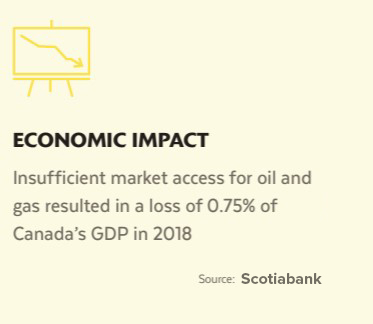
Pipeline impasse
Just three days after the official start of construction, the Federal Court of Appeal overturns Ottawa’s approval of the 1,150-km Trans Mountain Pipeline expansion project. The decision is the latest in a series of setbacks for the much-needed project. The Business Council had previously warned that a failure to build the pipeline would “cast serious doubt over Canada’s reputation as a safe place for investment.” It would also deny governments hundreds of millions of dollars worth of royalties and tax payments that support a wide range of vital public services.

Nine principles for data protection and privacy
Following consultations with more than 50 member companies, the Council proposes a nine-point policy framework to safeguard the personal data and privacy of Canadian citizens. “Canada has traditionally relied on markets to efficiently allocate valuable resources. But markets only function successfully when there are clear rules, when participants have well- defined and enforceable rights, and when transactions occur in a transparent, competitive, and secure marketplace.”
September 2018
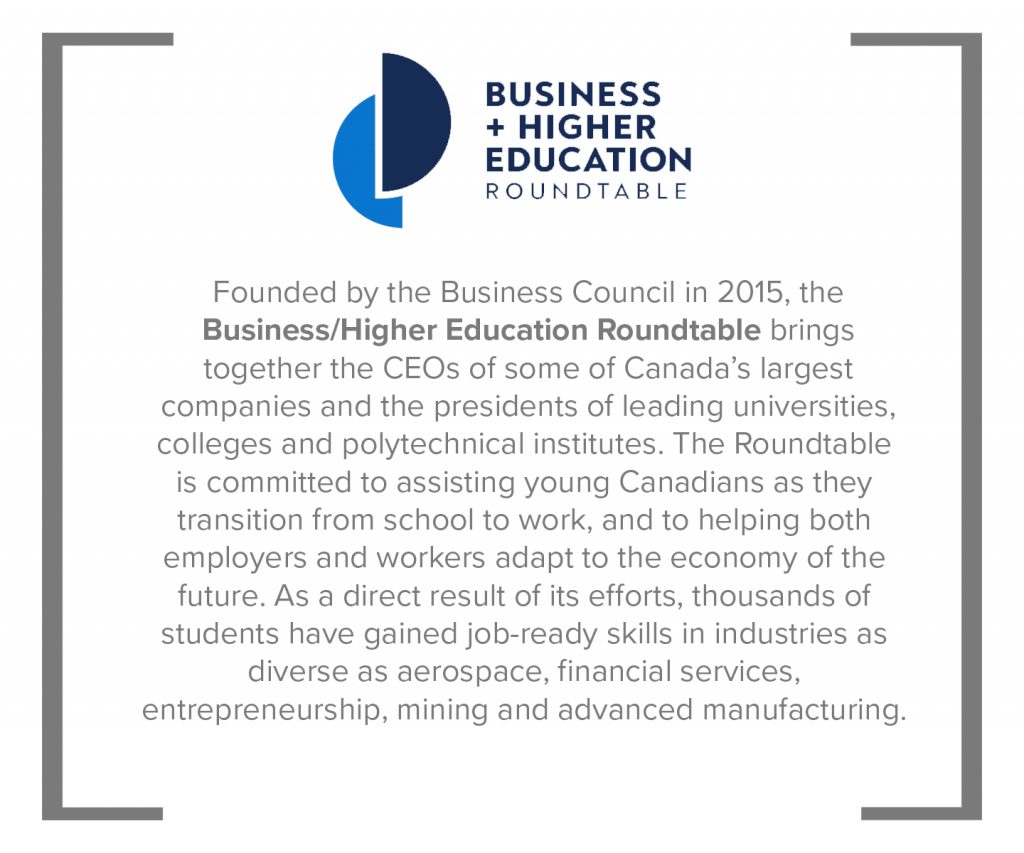
Building support for a national strategy on work-integrated learning
Spearheaded by the Business/Higher Education Roundtable, 25 leaders from student, business and post-secondary organizations call on the federal government to facilitate a national strategy on work-integrated learning. In a letter to Finance Minister Bill Morneau, they ask for new investments in a cross-Canada platform that will make it easier for employers and students to connect and participate in work placements.
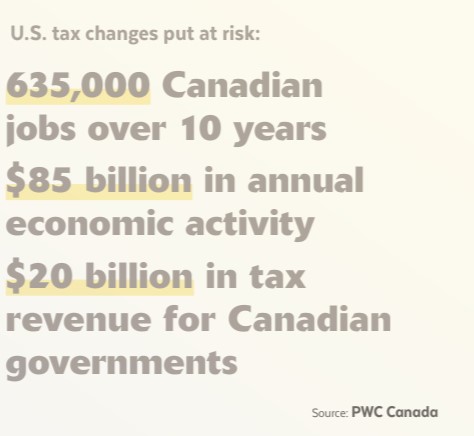
Measuring the impact of U.S. tax reform on Canada
A U.S. tax reform bill that took effect in 2018 “has eliminated one of Canada’s main competitive advantages”, a PwC Canada study says. The bill cut the U.S. corporate tax rate from 35 to 21 per cent and allowed companies to immediately deduct the full cost of capital spending. That makes the United States “a substantially more attractive place to locate capital-intensive businesses.” The study was commissioned by the Business Council.
NAFTA 2.0
The Council congratulates the Government of Canada on achieving a successful outcome in North American trade negotiations. “The agreement provides much-needed certainty and clarity for investors in all three countries, enabling companies to move forward with job-creating projects and expansion plans. We hope and expect that the Government of Canada and the U.S. Administration will continue talks aimed at lifting the illegitimate tariffs on Canadian steel and aluminum exports, to the serious detriment of producers, manufacturers and consumers.”

Digital advocacy
Launched in 2017 and continuously updated, the Council’s interactive online North American trade map has been an invaluable tool for communicating the positive impact of the bilateral partnership on a national, state and congressional-district level. It remains one of the most visited pages on our website.
- Nearly 40,000 interactions
- Over 3,200 downloads of factsheets
- Frequently accessed by government officials and policy researchers in both countries
Autumn members’ meeting
New York City
On the same day that negotiators reach an agreement-in-principle on North American free trade, Council members arrive in New York City for two days of meetings with top U.S. decision-makers. Speakers include:
Jamie Dimon
Chairman and CEO, JPMorgan Chase
Stephen Schwarzman
Chairman and CEO, Blackstone
Lloyd Blankfein
retired Chairman and CEO, Goldman Sachs
Tom Donohue
President and Chief Executive Officer,
United States Chamber of Commerce
Maria Bartiromo
Global Markets Editor, FOX Business Network
Ian Bremmer
Founder and President of the Eurasia Group
Stephen Poloz
Governor, Bank of Canada
Dan Doctoroff
former Deputy Mayor of New York City
and CEO, Sidewalk Labs
Lawrence Summers
former U.S. Secretary of the Treasury
Laura D’Andrea Tyson
former Chair, Council of Economic Advisers
October 2018
Fighting cybercrime
The Council welcomes the establishment of the Canadian Centre for Cyber Security, a major milestone in the way the government approaches cyber security. Nine months earlier, the Business Council had called on Ottawa to “bring forward a comprehensive, government-wide strategy on cyber security that emphasizes the importance of collaboration between the private and public sectors.” The new agency is intended to be a single unified source of expert advice, guidance, services and support on cyber security for government, critical infrastructure owners and operators, the private sector and the public.


Passing the torch
After nine years as President and Chief Executive Officer of the Business Council, The Honourable John Manley steps down and is succeeded by Goldy Hyder. During his tenure, Mr. Manley oversaw significant growth in membership, raised the Council’s visibility in several important policy areas and initiatives, and modernized the organization’s corporate governance structure.
Towards a better global trading system
While trade ministers from 12 countries and the European Union confer in Ottawa, the Council joins other leading international business organizations in a call to modernize the World Trade Organization, which was established in 1995 to regulate global trade. “After 23 years the WTO is badly in need of an update to reflect the realities of a changing global economy and the evolving needs and expectations of our citizens,” the business groups say in a joint communiqué. “We encourage the member states of the WTO to work together to enhance its functionality, transparency and fairness.”
Work-integrated learning is a win-win-win
Members of the Business/Higher Education Roundtable meet with key government decision-makers in Ottawa to highlight the value of federal investments in skills and training. The message: a coordinated national approach to work-integrated learning will benefit students, postsecondary institutions, and businesses of all sizes.
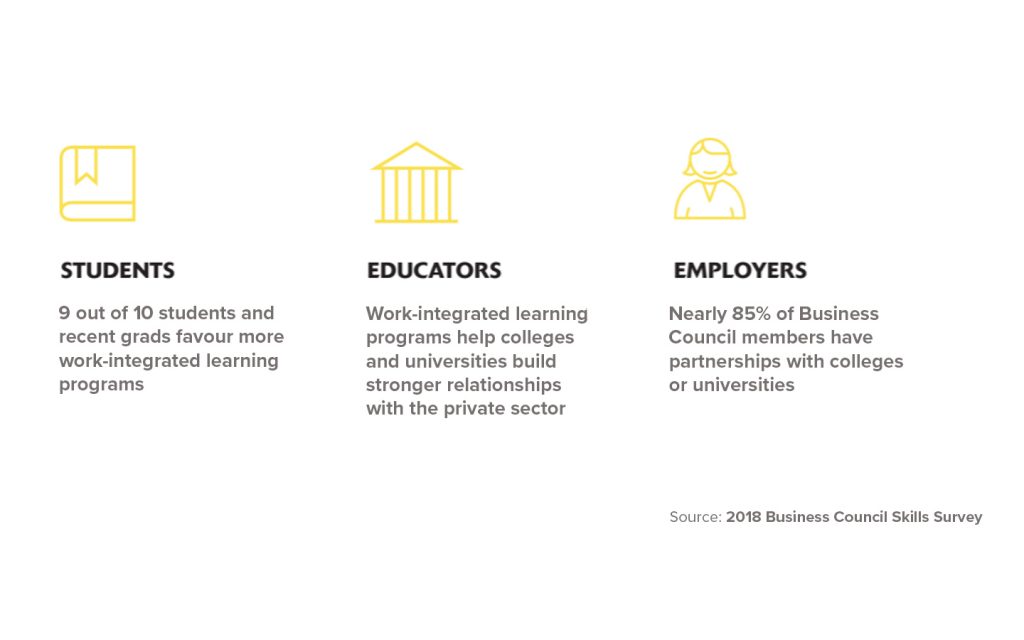

Advancing women in business
The Canada-U.S. Council for Advancement of Women Entrepreneurs and Business Leaders releases its fifth and final report. It finds that despite a commitment to hiring and promoting women, many companies lack clear goals, the ability to measure progress, and accountability in boosting women’s economic engagement. “While leaders want more women in the higher ranks and are committed to the cause, they are not approaching the problem the way they would any other business priority,” says the council, which is co-chaired by Linda Hasenfratz, CEO of Linamar Corp., and Julie Sweet, CEO North America of Accenture.
Several recommendations of the Canada-U.S. Council for Advancement of Women Entrepreneurs and Business Leaders have been implemented, including:
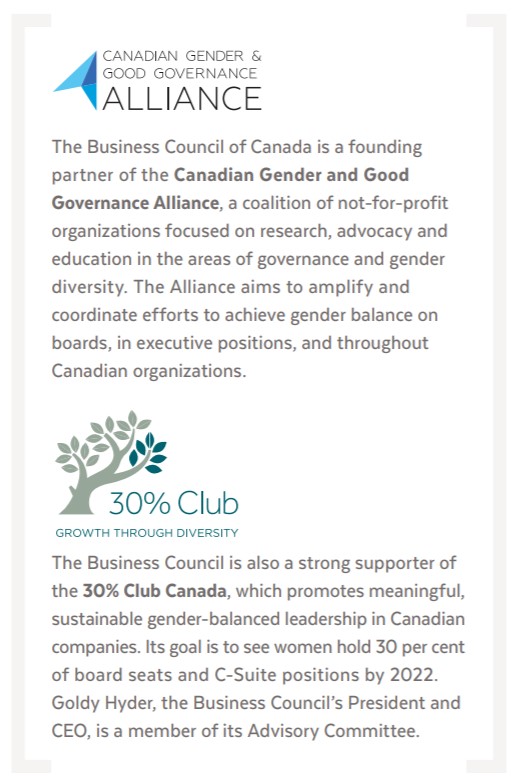
- A $200 million venture capital fund for women-led technology companies, created by the Business Development Bank of Canada.
- The launch in November 2018 of “See It Be It STEM It”, a business-led initiative to inspire young women to pursue their interest in science, technology, engineering, and math.
- The first-ever Women Entrepreneurship Strategy, a $2-billion investment by the Government of Canada that seeks to double the number of women-owned businesses by 2025 while helping them innovate, grow, and access new markets.
- Measures to increase by 50 per cent the level of federal government procurement from small- and medium-sized enterprises that are majority-led by women.
- A five-year, $10 million plan to connect women entrepreneurs with expanded export services and opportunities through the federal government’s Business Women in International Trade Program.
November 2018
Encouraging job-creating investments
Despite previously playing down the need to respond to U.S. tax reform, the federal government reverses course by unveiling $14.4 billion in new tax incentives to encourage job-creating investments in machinery, equipment, clean technology and other assets. In his Fall Economic Statement, Finance Minister Bill Morneau acknowledges that the elimination of Canada’s longstanding tax advantage over the United States “could have significant impacts on investment, jobs and the economic prospects of middle-class Canadians.” The Business Council applauds the move but notes that Canada’s competitiveness challenges go much deeper than any single tax measure. “We will continue to urge the government to adopt a comprehensive strategy to foster business confidence, attract investment and enable the creation of new, high-value jobs,” Goldy Hyder says.
“Liberals deliver tax breaks for businesses in response to Trump’s rate cuts.”
The Globe and Mail
“Trudeau cuts Canadian business taxes to keep pace with U.S. moves.”
Bloomberg
Corporate Innovator Network
The Business Council launches a new network to bring together key innovation decision-makers from many of Canada’s leading companies. In less than a year, the network has grown from a dozen to more than 50 C-suite and VP-level representatives. Members meet regularly to share experiences and best practices in driving innovation within large, established organizations.
December 2018
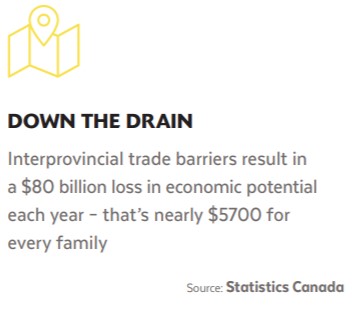
Call for action on internal trade
On the eve of a First Ministers’ meeting in Montreal, the Council urges the Prime Minister, 10 premiers and three territorial leaders to accelerate efforts to reduce trade barriers in Canada. In an open letter, Goldy Hyder says it is time to show results. “The situation today – more than two years after the signing of the Canadian Free Trade Agreement – is intolerable. Inefficient and overlapping regulatory systems stand in the way of trade and business growth, costing Canadians millions of dollars every day in
higher prices and lost income. Nowhere is this more obvious than in the energy sector, where our inability to build pipeline infrastructure has imposed a severe burden on workers, families and communities.”
Consensus-building on energy and the environment
The Standing Senate Committee on Energy, the Environment and Natural Resources begins an exhaustive, months-long review of Bill C-69, which proposes to overhaul the environmental review process for major natural resource projects, such as pipelines and mines. As the hearings unfold, the Business Council works to try to broker a compromise among industry, government and other stakeholders, many of whom fear that the legislation will make it all but impossible to get new projects approved.
The Council’s litmus test for Bill C-69:
- Does it improve Canada’s attractiveness as a location for investment?
- Does it result in an approval process for major resource projects that is efficient, timely and balanced?
- Does it limit ministerial authority to override a decision by the regulator?
- Does it clarify the obligation to consult with Indigenous communities whose members may be affected by a proposed project?
Expanding Asia-Pacific trade
Eight years after the Business Council first recommended that Ottawa seek
to join a proposed Asia Pacific trade deal, Canadian exporters celebrate the
implementation of the Comprehensive and Progressive Agreement for Trans-Pacific Partnership (TPP). Canada is among the first six countries to ratify the agreement, alongside Australia, Japan, Mexico, New Zealand, and Singapore. A 2011 report published by the Council said that joining the TPP would be “a potential game-changer” in advancing Canada’s economic and political interests in the fast-growing Asia Pacific region.

January 2019

Launch of “Speaking of Business”
The Council’s new podcast series kicks off with Geoff Smith, President and CEO of EllisDon. New episodes every three weeks feature revealing conversations with Canada’s top innovators, entrepreneurs and business leaders.
- More than 4,000 downloads from listeners around the world
- 15 episodes recorded in its first nine months
- Life stories and lessons from Canada’s most interesting and influential business leaders
New Year members’ meeting
Toronto
Linamar CEO Linda Hasenfratz, wrapping up a successful three-year term as Chair of the Business Council, steps down and is succeeded by Don Lindsay, President and CEO of Teck Resources. In his inaugural address, Mr. Lindsay sets the stage for a major new advocacy campaign for Canadian
competitiveness. “The transformation of the global economy over the past two decades – the rapid growth of emerging markets and the creation of billions of new middle-class consumers – has created huge new areas of business opportunity,” he says. “But it also has thrown down a clear challenge for Canada – one that we have struggled to meet. . . Our Council can and must play a bigger role in fostering a national dialogue on competitiveness and helping to shape the policies needed to keep jobs and investment in Canada.”

The Council’s first meeting of 2019 includes a special dinner and tribute to John Manley, who served as President and CEO for nine years. Also on the agenda: a fireside chat with Andrew Scheer, Leader of the Conservative Party of Party; a dialogue with Finance Minister Bill Morneau; a CEO panel on autonomous vehicles; and a visit to the proposed site of a sweeping new smart-city development led by Sidewalk Labs, sister company of Google.
February 2019

Business leaders chart a path for growth
Launched in February 2019, the Task Force on Canada’s Economic Future promises to consult widely and work with a diverse range of Canadians. The goal: a short list of practical recommendations “that can significantly improve the country’s ability to compete for jobs and investment within a transforming global economy.”
“At a time of political polarization and an increasing emphasis on short-term issues, we see both an opportunity and a need to bring Canadians together in support of smart policies and a long-term strategy that will help us raise our game.”
Nicole Verkindt, Louis Vachon and Chuck Magro
Co-Chairs | Task Force on Canada’s Economic Future
Keeping score
Following the launch of the Task Force on Canada’s Economic Future, Deloitte completed Canada’s first-ever Competitiveness Scorecard, comparing the country’s performance relative to 12 peer nations including the United States, the United Kingdom, Germany, Sweden and Japan. Developed in collaboration with the Business Council, the scorecard allows Canadians to see at a glance the areas where Canada leads and where it lags.
“Canada is one of the top countries in the world to start, grow, and invest in a business. But to continue leading, our country must remain focused on supporting an economic environment that builds on our strengths and takes aim at factors that are holding us back.”
Frank Vettese Chief Executive | Deloitte Canada
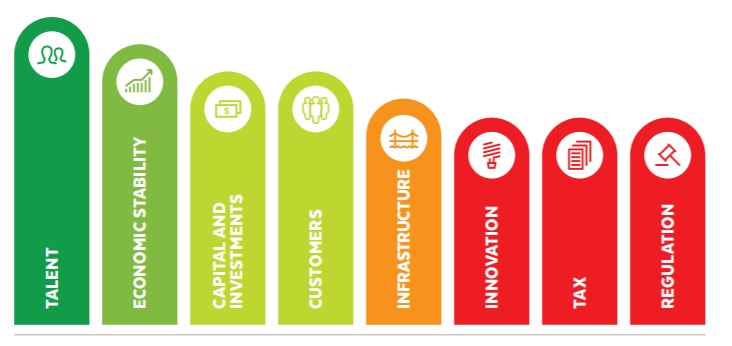

Boosting trade ties with Japan
Seeking to capitalize on the recently implemented Pacific trade agreement, Goldy Hyder travels to Japan for meetings with senior government and business leaders in Tokyo, Nagoya and Kyoto. The visit is intended to lay the groundwork for a future CEO mission to boost bilateral trade and investment.
March 2019
A push for prosperity
The Council’s pre-budget letter to Finance Minister Bill Morneau warns of economic uncertainty caused in part by rising trade tensions and low prices for many of Canada’s most important exports. The letter puts forward a series of recommendations to improve competitiveness, including:
- Concerted efforts to lift U.S. tariffs on Canadian steel and aluminum.
- A policy regime that supports the building of additional infrastructure to enable Canadian energy to access markets beyond North America.
- The elimination of longstanding regulatory bottlenecks that impede business investment and force consumers to pay higher prices for goods and services.

The Council also endorses the Business/Higher Education Roundtable’s recommendation for a national strategy in support of work-integrated learning (WIL). “Investing in WIL, and other programs to help workers upgrade their skills, will help Canadians thrive in a changing world.”
“Business Council calls on finance minister to table a budget that builds Canada’s competitive advantage.”
CBC News
“Hyder expects the budget will highlight ‘skills and the importance of preparing for the workforce of the future while you’re currently in it.”
Bloomberg
“Valerie Walker, executive director of the Council’s Business/Higher Education Roundtable, [is] hoping the budget will provide funding for tens of thousands more student placements to provide workplace experience.”
Toronto Star
Speaking out on Canada’s future
With an address to the C.D. Howe Institute in Toronto, Goldy Hyder kicks off a speaking tour in support of the Task Force on Canada’s Economic Future. The series of formal and informal appearances includes stops at universities, chambers of commerce, regional boards of trade, international conferences and leadership events for business executives

Budget 2019: positive investments in people, more work needed on growth
In his fourth budget, Finance Minister Bill Morneau announces significant new investments in skills training – including nearly $800 million to help employers expand work-study programs for Canadian students. The budget
explicitly endorses the goal of the Business/Higher Education Roundtable to ensure every post-secondary student in Canada has access to some form of work-integrated learning, such as a co-op, paid internship, apprenticeship, or applied research project. “We welcome the federal government’s decision to join this effort to help Canadian graduates hit the ground running, with the skills and experience they need to succeed,” Goldy Hyder says. At the same time, the Council expresses disappointment in the budget’s failure to address the root cause of Canada’s economic challenges: the fact that many other countries offer a more attractive destination for business investment, talent and job creation. “The real solution is for governments to work collaboratively with business, labour and others to build a strategy for economic growth.”
April 2019
Spring members’ meeting
Vancouver
Close to 100 CEOs from across the country gather in Vancouver to begin the work of identifying key policy priorities for the Task Force on Canada’s Economic Future. Over the course of an afternoon, Council members roll up their sleeves in six separate workshops focused on different dimensions of competitiveness. “Fundamentally, this is about building a better and stronger Canada,” Chair Don Lindsay says at the outset of the meeting. Participants in each session are asked to consider not just what governments could do to attract investment and enhance Canada’s growth prospects, but also the role that the business community can play in contributing to a better future for all citizens. That evening, members visit the headquarters of TELUS for a reception with B.C. Premier John Horgan, followed by dinner and a fireside chat with Chip Wilson, renowned entrepreneur, philanthropist and founder of Lululemon.
60 seconds with the Business Council
Only have a minute to spare? Each episode of our new video series, #60Seconds, focuses on a single event or public policy issue and succinctly explains what’s at stake for business, workers and Canada’s economy.

Leadership lessons
Over a two-month period, Goldy Hyder meets with five former Prime Ministers – Brian Mulroney, Jean Chrétien, Paul Martin, Joe Clark and Stephen Harper – to seek advice and learn from their experiences in addressing Canada’s economic and social challenges.
May 2019
Engaging Canadians
The Task Force on Canada’s Economic Future launches a new bilingual website – ItsAboutCanada.ca and ToutpourleCanada.ca – supported by an eight-week digital media campaign that reaches more than 1.1 million people. Thousands of Canadians join the conversation and hundreds contribute recommendations to strengthen economic growth.

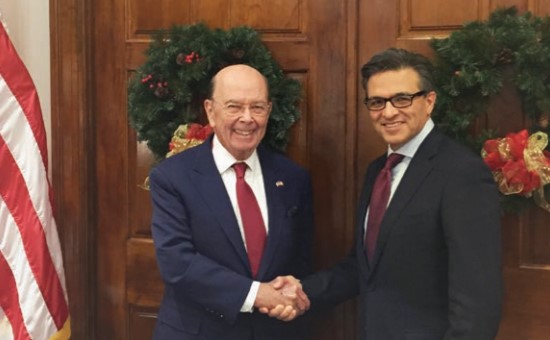
Breakthrough on U.S. tariffs
Canada’s business leaders welcome the removal of U.S. tariffs on Canadian steel and aluminum, a move that will benefit consumers, workers and companies on both sides of the border. “With this key obstacle out of the way, the Business Council of Canada urges all parties to move swiftly toward the ratification of the Canada-United StatesMexico Agreement,” Goldy Hyder says. “The citizens of all three countries are looking to their leaders to turn the page on this costly and damaging chapter of trade uncertainty.”
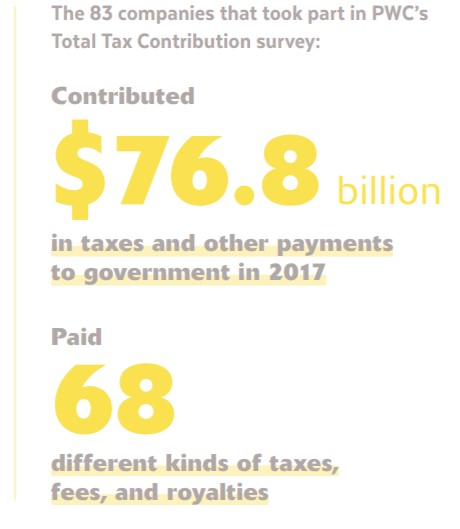
The tax contributions of Canada’s leading enterprises
PwC Canada’s sixth annual Total Tax Contribution survey demonstrates the vital link between a healthy business sector and sustainable public finances. It also underscores the urgent need for a comprehensive review of the tax system to reduce complexity and boost Canada’s overall global competitiveness.
Canada’s new Digital Charter
Flanked by members of the Business Council, Innovation Minister Navdeep Bains unveils details of Canada’s new Digital Charter. The charter is intended to build a foundation of trust among governments, citizens and companies to ensure that privacy is protected, data is kept safe, and Canadian companies can lead the world in digital innovation. It draws on many of the principles outlined months earlier by the Council.
June 2019
CEOs call for leadership
As Parliament wraps up for the summer and federal politicians dig in for the fall election campaign, the Business Council publishes an open letter calling for leadership in advancing a strategy for Canada’s economic success. “On October 21, Canadians will choose their next federal
government,” says the letter, signed by all 24 members of the Council’s Board of Directors and the co-chairs of the Task Force on Canada’s Economic Future. “They deserve to know what each of your parties would do to meet the pressing challenges to our country’s economy and the well-being of its people.”
“One of the Task Force co-chairs, National Bank President Louis Vachon, says their intention is not to be alarmist, but realistic: ‘We are not thinking just about the next 18 months, but about the next three, five or 10 years.'”
La Presse
“The chief executives of some of Canada’s largest companies are rightly worried that the major economic challenges facing the country are getting short shrift, as the October federal election nears. And they’re determined to do something about it.”
The Globe and Mail
Co-chairs convene roundtables across Canada
The Toronto Region Board of Trade hosts the first of three stakeholder roundtables to gather input for the Task Force on Canada’s Economic Future. Subsequent roundtables take place in Montreal, hosted by the Institute for Research on Public Policy, and Calgary, hosted by the Canada West Foundation. The consultations bring together representatives of think tanks, social policy agencies, Indigenous organizations, industry associations and other groups. Common themes include the importance of long-term infrastructure planning, the elimination of inter-provincial trade barriers, and coordinated efforts by employers and governments to strengthen education and skills and training, particularly for under-privileged Canadians. In all three cities, participants discuss the need for a more efficient approach to regulation. “High standards are important, but regulations should not necessarily dictate how those standards are to be met,” one participant says. “Too often in Canada, we take a ‘belt and suspenders’ approach, which leads to unnecessary costs and delays.”

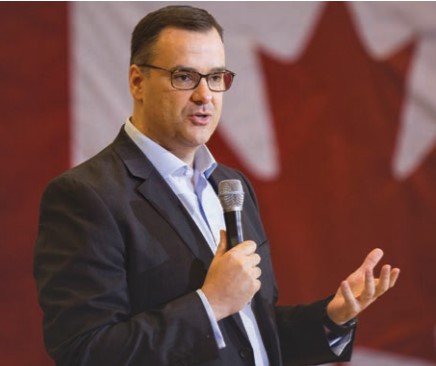
Data-driven: Canada’s economic opportunity
The Honourable James Moore, former federal Industry Minister, agrees to lead a non-partisan study on how to modernize Canada’s digital policies. The initiative will include consultations with business leaders, innovators and policy experts across the country. “Canada has the potential to be a global leader in the harnessing of digital technologies and data to fuel economic growth and improve the lives of all citizens,” Moore says. “I look
forward to working with Business Council members and other stakeholders in developing a smart data policy framework that inspires public trust and confidence while promoting innovation and competition in the marketplace.”
Delegation in support of NAFTA 2.0
Don Lindsay, in his role as Chair of the Business Council, leads a CEO delegation to Washington, D.C. in support of the new North American trade agreement. In addition to meeting top Republican and Democratic lawmakers, they hold a trilateral session with leaders from the Business
Roundtable – which represents the CEOs of America’s largest companies – and the Consejo Mexicano de Negocios, Mexico’s leading business organization. In a joint statement, the three groups call for timely ratification of the agreement, saying it will make the North American economy “even more vibrant and competitive, drive investment and support the creation of high-value jobs.”

Green light for TMX
The Council welcomes the federal Cabinet’s reaffirmation of its decision to approve the Trans Mountain pipeline expansion project (TMX). “After all the debates, reviews, hearings and court challenges, only one thing remains: build it now!”
Bill C-69 fails the litmus test
In an op-ed in The Globe and Mail, Goldy Hyder laments the federal government’s decision to accept only a small number of the Senate’s proposed substantive changes to Bill C-69. “The bill as amended is better, and in particular addresses some flaws in the previous legislation that hindered the ability of the mining industry to move forward expeditiously with needed investments. But overall, it falls short of what was required to win the broad support of the energy sector. For that reason, we cannot endorse it.”
July 2019
A message for First Ministers
The Business Council joins forces with the Canadian Federation of Independent Business (CFIB), which represents the interests of more than 110,000 small and medium-sized enterprises, in a call for faster progress in dismantling interprovincial trade barriers. “How can we expect a company to be successful in Sapporo if it can’t reach customers in Saskatoon?,” Goldy Hyder and Dan Kelly, his CFIB counterpart, ask in an op-ed in The Globe. “We urge premiers to act decisively on this issue and bring interprovincial trade into the 21st century.”
“In an era of political polarization, technological transformation and rising competition, we cannot afford to take anything for granted. To preserve Canadians’ high quality of life, we need to be ambitious, forward-looking, and united.”
Goldy Hyder President and CEO | Business Council of Canada
Working together for Canadian students
The Business/Higher Education Roundtable officially becomes an independent, not-for-profit organization with the task of leading the development and implementation of Canada’s national work-integrated learning strategy. “The federal government’s strong commitment to this initiative will help engage businesses – particularly small and medium-sized ones – to offer 44,000 new studentwork opportunities over the next three years,” says Dave McKay, co-chair of the Roundtable, at a funding announcement in Toronto.

Selected Publications












